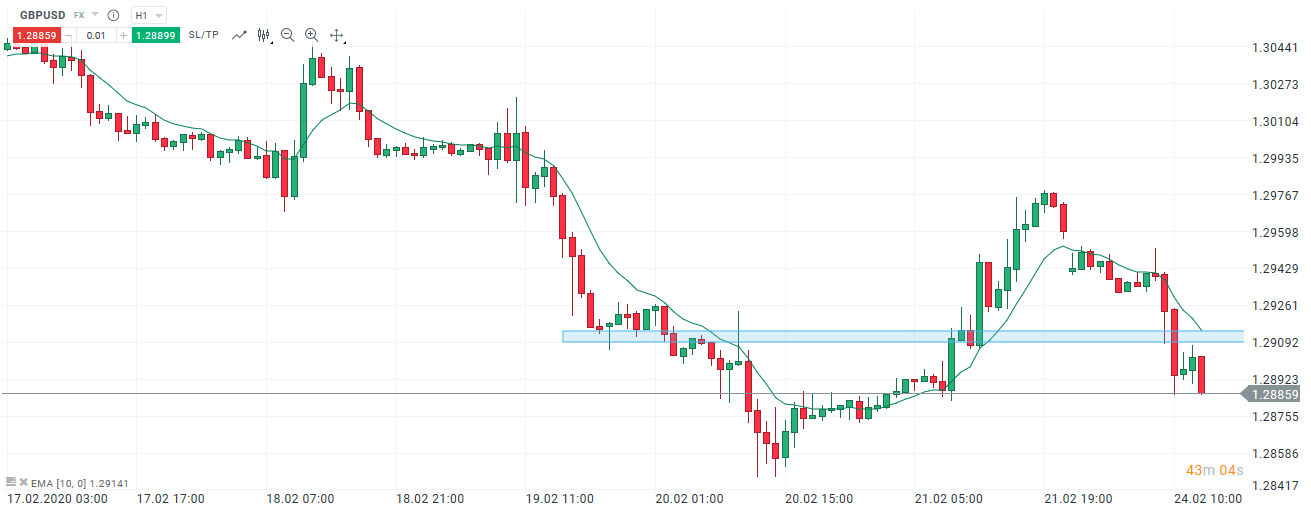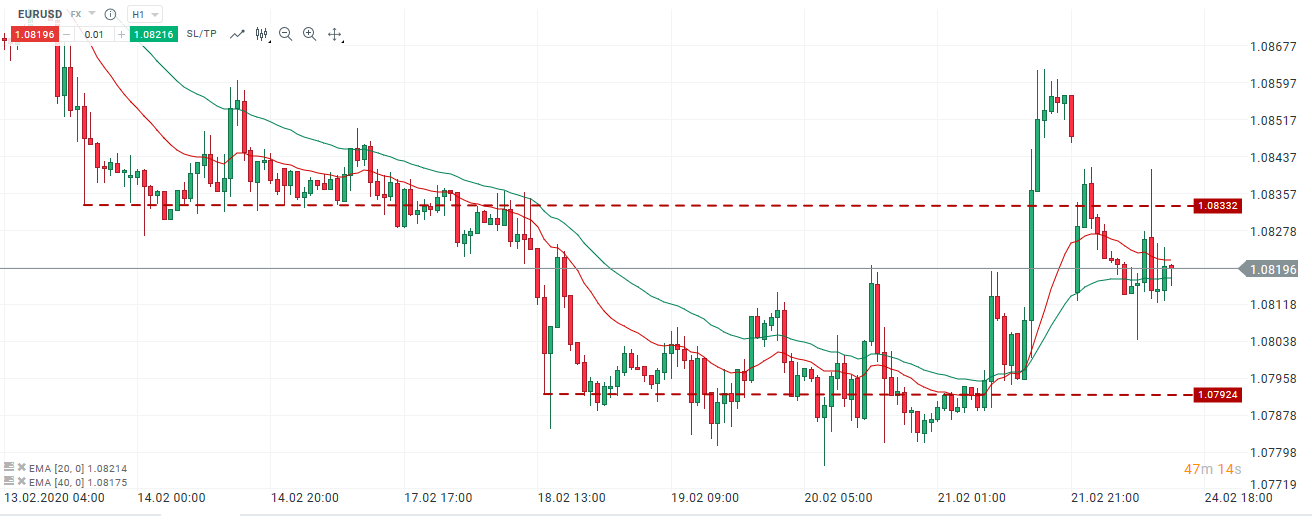Currency summary of the week. Bad Friday for the dollar.
Last week has passed virtually unchanged. The exception was Friday, in which we saw a strong correction during which the dollar lost nearly 70-90 points against the pound and the euro. To a large extent, the reflection was the cumulative situation that has been on the market for at least a dozen or so days. Federal Reserve it does not announce any moves in the near future, and the dollar remains strong just like the US economy. Can we expect a correction in the dollar supply this week?
No perspectives?
It would seem that the markets all the time, within a dozen or so days back, look practically the same. Why? Does this mean that we are at a standstill? Not completely. The fact is, the market lacks freshness. All the time, the global economic situation oscillates around poor data from European industry, the coronavirus and the green island - the United States, which stubbornly and effectively defend itself against external factors.

Chart GBP / USD, H1 interval. Source: xNUMX XTB xStation
More on the future of the dollar and the US economy brought in Minutes FOMC, which took place at the end of last week. According to bankers' records of conversations, the current policy is on hand. The comfort of these activities will certainly translate into a lack of more ambitious interest rate actions. Moreover, the data published a few days ago will support this decision. They are amazingly good from a global perspective. They are largely the result of reductions that the Fed decided to do in 2019. Due to the fact that the market adopts such changes over a period of several months, it can be undoubtedly said that they still affect good real estate market readings. Being still relatively cautious in such estimates, I would add that in the light of recent macroeconomic publications, US GDP is not threatened. Admittedly, the US is currently bypassing issues related to coronavirus and trade tensions, and is focusing all its attention on the upcoming elections.
In view of the above, it is hard to talk about the vision of permanent depreciation of the dollar. One of the strongest depreciating assets is the euro. Perhaps the Friday rebound is only a moment of weakness, and next week we will see further supply movements.
Tuesday's pessimism and momentary breathing
It's hard to be optimistic when looking at the data and dynamics of even the industry in the Euro Zone. Fortunately, it is not (or not) the only exception in the world. Japan and China are also struggling with the slowdown, which, by fighting the epidemic, has virtually stopped the industry and services sectors. There is no secret here that the data for February and the next months will not be neutral.
Poor sessions in Asia and information from Apple have also significantly affected the trading in Europe. Moods, even on the Polish stock market, introduced new supply to the market. Politics European Central Bank in the context of interest rate operations, it is currently in a huge stagnation. We know that he will undertake any intervention only as a last resort, which is not a very good omen for the market. The ECB is definitely more focused on long-term fiscal policy than on preventing and hedging short-term market fluctuations. Is this the right thing to do?
Improvement of moods for the euro was brought by recent PMI publications from industry. It is possible that in the next months we will also be dealing with it due to the stagnation of the Chinese economy and greater demand for "local" services and goods. However, we should not be surprised that it will only be a short-term improvement.

Chart EUR / USD, H1 interval. Source: xNUMX XTB xStation
Given the fact that there is no major impulse on the European market causing potential recovery, the situation after calming down global moods may return to a deeper slowdown. The biggest global worry in the coming months will be the virus. Reports of its rapid spread are causing increasing panic, which in my opinion has not yet been sufficiently valued by the markets. Currently, Europe is quite ignorant about the coronavirus, as if this problem has not largely affected us. Despite the lack of direct contact with the economic problems posed by the epidemic, the slack of Chinese industry will sooner or later affect trade in the Old Continent.






















![Forex Club – Tax 9 – Settle tax on a foreign broker [Download the Application] Forex Club - Tax 9](https://forexclub.pl/wp-content/uploads/2024/02/Forex-Club-Podatek-9-184x120.jpg?v=1709046278)
![Trading View platform – solutions tailored to the needs of traders [Review] trading view review](https://forexclub.pl/wp-content/uploads/2024/03/trading-view-recenzja-184x120.jpg?v=1709558918)
![How to connect your FP Markets account to the Trading View platform [Guide] fp markets trading view](https://forexclub.pl/wp-content/uploads/2024/02/fp-markets-trading-view-184x120.jpg?v=1708677291)
![How to invest in ChatGPT and AI? Stocks and ETFs [Guide] how to invest in chatgpt and artificial intelligence](https://forexclub.pl/wp-content/uploads/2023/02/jak-inwestowac-w-chatgpt-i-sztuczna-inteligencje-184x120.jpg?v=1676364263)


![WeWork – the anatomy of the collapse of a company valued at $47 billion [WeWork, part II] wework bankruptcy story](https://forexclub.pl/wp-content/uploads/2024/04/wework-bankructwo-historia-184x120.jpg?v=1711729561)
![Adam Neumann – the man who screwed up Softbank [WeWork, part AND] adam neumann wework](https://forexclub.pl/wp-content/uploads/2024/04/adam-neumann-wework-184x120.jpg?v=1711728724)





![How to transfer shares to another brokerage office [Procedure description] how to transfer shares to another brokerage house](https://forexclub.pl/wp-content/uploads/2024/03/jak-przeniesc-akcje-do-innego-biura-maklerskiego-184x120.jpg?v=1709556924)

![The most common mistakes of a beginner trader - Mr Yogi [VIDEO] Scalping - The most common mistakes of a beginner trader - VIDEO](https://forexclub.pl/wp-content/uploads/2024/03/Scalping-Najczestsze-bledy-poczatkujacego-tradera-VIDEO-184x120.jpg?v=1711601376)
![Learning patience: No position is also a position - Mr Yogi [VIDEO] Scalping - Learning patience - No position is also a position - VIDEO](https://forexclub.pl/wp-content/uploads/2024/03/Scalping-Nauka-cierpliwosci-Brak-pozycji-to-tez-pozycja-VIDEO-184x120.jpg?v=1710999249)
![When to exit a position and how to minimize losses - Mr Yogi [VIDEO] Scalping - When to exit a position and how to minimize losses - VIDEO](https://forexclub.pl/wp-content/uploads/2024/03/Scalping-Kiedy-wyjsc-z-pozycji-i-jak-minimalizowac-straty-VIDEO-184x120.jpg?v=1710336731)





![Learning patience: No position is also a position - Mr Yogi [VIDEO] Scalping - Learning patience - No position is also a position - VIDEO](https://forexclub.pl/wp-content/uploads/2024/03/Scalping-Nauka-cierpliwosci-Brak-pozycji-to-tez-pozycja-VIDEO-300x200.jpg?v=1710999249)












